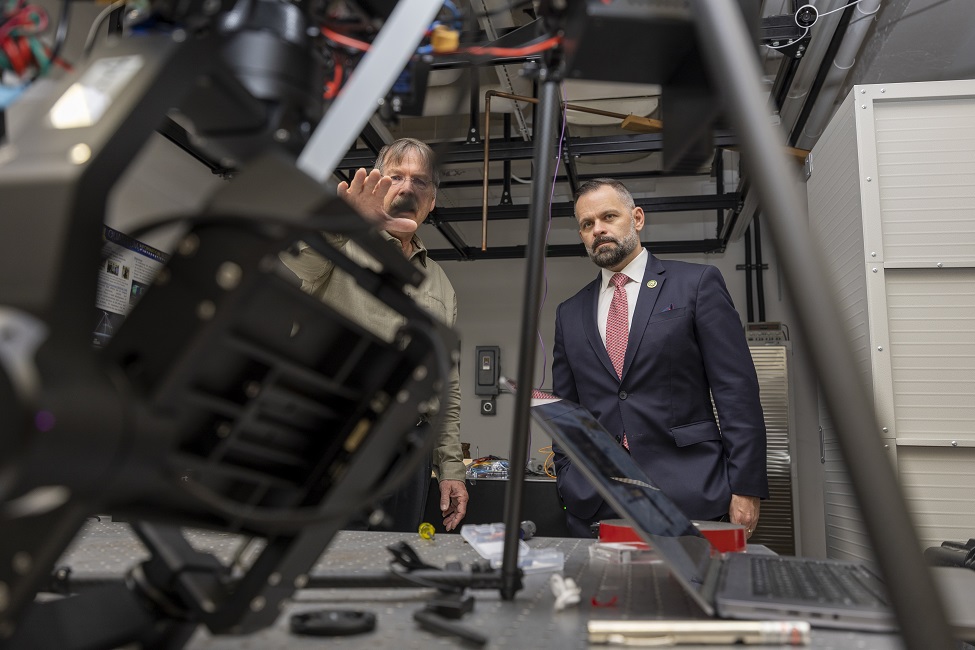U.S. Representative Tours First Drone-based Quantum Network at FAU

(Left) Warner A. Miller, Ph.D., shows U.S. Rep. Cory Mills (R-Fla.) the nation’s first drone-based, mobile quantum network housed at FAU. (Photo by Alex Dolce)
United States Rep. Cory Mills ( R-Fla.) visited Florida Atlantic University today to tour FAU’s quantum physics laboratory in the Charles E. Schmidt College of Science. Warner A. Miller, Ph.D., a professor of physics who spearheads the laboratory, provided an overview and demonstration of the nation’s first drone-based, mobile quantum network housed at FAU.
The network includes a ground station, drones, lasers and fiber optics to share quantum-secured information. Today’s telecommunication networks use fiber optics, connected by laser beams from the ground and between planes and satellites — called fiber and free space optical networks. Drones are used to save lives, secure infrastructure, help the environment, and thwart hostile military advances.
“Harnessing the laws of nature – namely quantum physics – a cutting-edge teleportation technology is taking cybersecurity to new, ‘unhackable’ heights using miniscule particles of light or beams,” said Miller, a retired lieutenant colonel, U.S. Air Force, who served honorably for 28 years and received a Meritorious Service Medal with Oak Leaf Cluster. “Using mobile quantum network, we can seamlessly maneuver around buildings, inclement weather and terrain and quickly adapt to changing environments such as warfare.”
FAU, Qubitekk and L3Harris are collaborating with the U.S. Air Force to combine expertise from academia, including the University of Illinois Urbana-Champaign, government and industry, with the future potential to scale up the project for larger applications with larger aerial platforms, as well as other ground and maritime platforms.
Quantum distribution provides a secure communication method for exchanging information between shared parties in a way that guarantees security. This phenomenon involves a pair of particles of light or photons that are generated in such a way that the individual quantum states of each are indefinite but correlated such that the act of measuring one instantaneously determines the result of measuring the other, even when they are at a great distance from one another. This phenomenon was referred to by Albert Einstein as “Spooky Action at a Distance.” Einstein noted that quantum mechanics should allow two objects to affect each other’s behavior instantly across vast distances as if the two are connected by a mysterious communication channel.
FAU’s contribution to the project and its student involvement in the technology is analogous to threading the eye of a fine needle using fiberoptics and co-propagating wavelengths that includes a near-infrared or invisible beam at the single-photon level. The entangled single-photon sources are produced by focusing a laser on special non-linear crystals and then processing the resulting “down-conversion” beam of photons. The optical alignment system uses mirrors that tilt to steer the photons directly where they need to go. The single photons travel one-by-one from the source drone to another to communicate securely.
“In war, for example, these drones would provide one-time crypto-keys to exchange critical information, which spies and enemies would not be able to intercept,” said Miller. “Quantum protects our information using the laws of nature and not just by a clever manmade code. One of our collaborators aptly stated, ‘whoever wins the quantum race will win the war.’”
-FAU-
Latest University Initiatives
- FAU Career Center Awarded 2025 'Best of Florida'Florida Atlantic University's Career Center has been named 2025 "Best of Florida" for College & Career Planning Services, as part of The Guide to Florida's annual reader awards.
- FAU Provost Russell Ivy, Ph.D., Earns National APLU AwardFAU's Interim Provost and Vice President for Academic Affairs, Russell Ivy, Ph.D., is the winner of the 2025 Michael P. Malone International Leadership Award.
- FAU Publishes Initial Annual Report: Florida Office of Ocean EconomyHoused at FAU, the Florida Office of Ocean Economy was created to position the state as a global leader in ocean-linked industries and to build the foundation for a thriving ocean economy.
- FAU Earns 2025 Eduventures Innovation AwardFlorida Atlantic University is one of just four higher education institutions in the nation to be recognized with the 2025 Eduventures Innovation Award, presented annually by Eduventures Research.
- FAU Exec Ed Program Ranked No. 1 in Florida for 3rd YearFlorida Atlantic University's Executive Education is ranked No. 1 in the state of Florida for the third year in a row for exceptional program offerings, according to The Financial Times.
- The Runway at Florida Atlantic Announces 15th Venture ClassThe Runway at Florida Atlantic recently accepted 17 companies to participate in the 15th cohort of its Venture Program.






